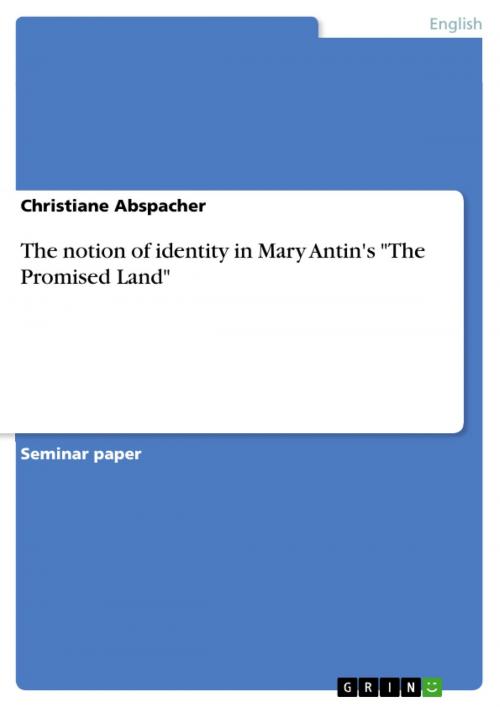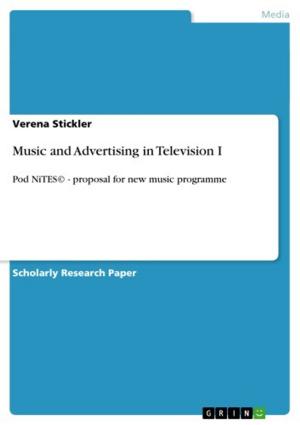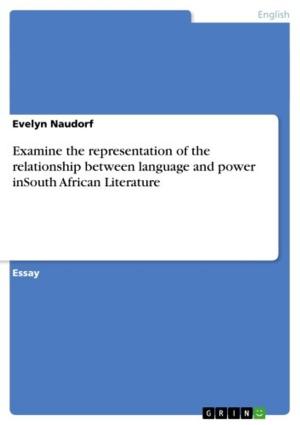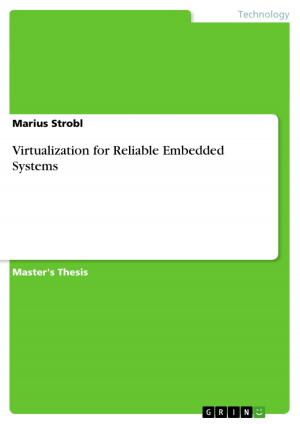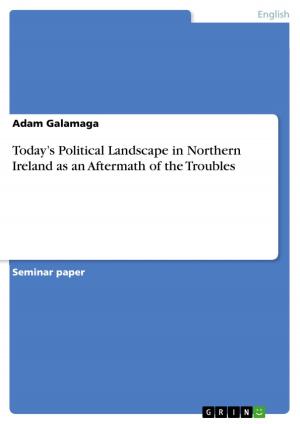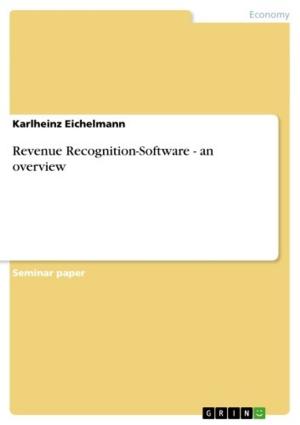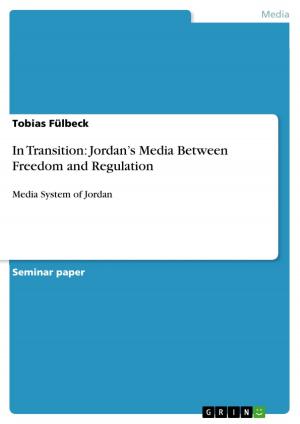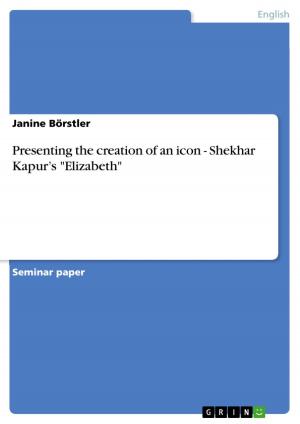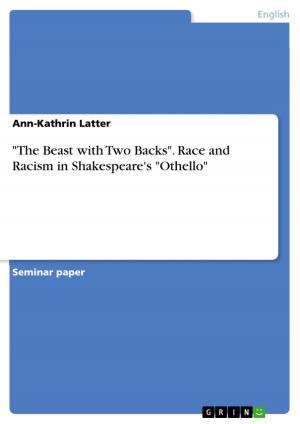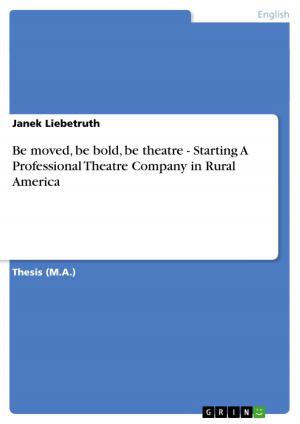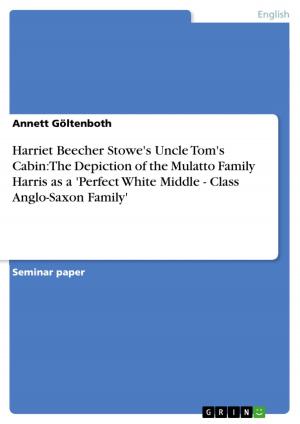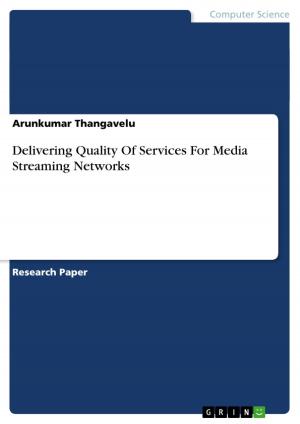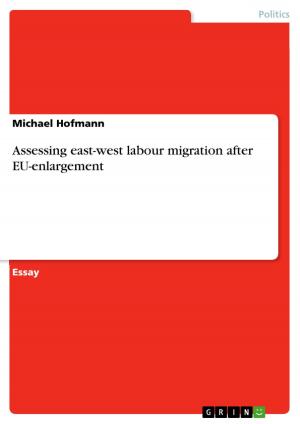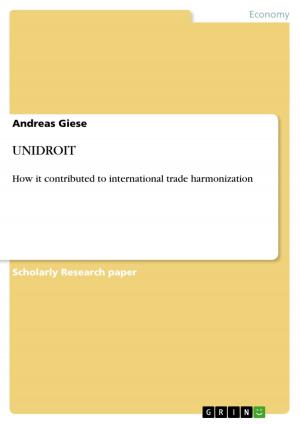The notion of identity in Mary Antin's 'The Promised Land'
Nonfiction, Entertainment, Drama, Anthologies| Author: | Christiane Abspacher | ISBN: | 9783638522809 |
| Publisher: | GRIN Publishing | Publication: | July 18, 2006 |
| Imprint: | GRIN Publishing | Language: | English |
| Author: | Christiane Abspacher |
| ISBN: | 9783638522809 |
| Publisher: | GRIN Publishing |
| Publication: | July 18, 2006 |
| Imprint: | GRIN Publishing |
| Language: | English |
Seminar paper from the year 2006 in the subject American Studies - Literature, grade: 1,7, University of Regensburg (Anglistik und Amerikanistik, Philosophische Fakultät ), course: Hauptseminar Amerikanistik (Literaturwissenschaft), 5 entries in the bibliography, language: English, abstract: In order to be able to grasp the dimension of the role identity plays in Mary Antin's The Promised Land, one has to take into consideration the author's biographical background, as the first part of her life differs completely from the later years. She is born in the Jewish Polotzk near Witebsk in White Russia. In 1894, the family emigrates to the United States. Mary receives solid school education and manages to have her first poem published in the Boston Herald at the age of fifteen. With the help of diligence, natural ability, curiousness and luck, Mary Antin advances from her proletarian neighbourhood to higher educated circles. Antin publishes several essays, short stories and poems, gives lectures and gets involved with the loosening of laws restricting immigration. Already at the age of twenty, Mary Antin writes her autobiography The Promised Land (formerly published under the name of 'From Polotzk to Boston'), which describes her childhood in Russia, her immigration to America, the initial problems in her new homeland and her success in gaining ground. Especially the preface causes attention, as she calls her life 'unusual, but by no means unique. (...) [A] concrete illustration of a multitude of statistical facts', while she is distancing herself from her former life as Maryashe Weltman in Polotzk. The high degree of self- reflexiveness and the dispartment of her own person into at least two identities predestine her book as a subject of inquiry by means of sociological investigation in the field of identity research. In order to discuss Mary Antin's notion of identity, it is required to outline the term itself. Within the last decades, this concept has become central to social science and it has turned from a technical term to an almost redundantly used catchphrase in virtually every field of everyday life. Thus, the perception of identity is as subjected to historical, social, political and emancipational changes as every other term referring to the self- reflexion of an individual, which also develops according to altering circumstances. This essay tries to concretise the term 'identity' in order to be able to grasp the difference between the 'given identity' in Polotzk and the 'hybrid, constructable identity' Mary Antin experiences in the United States. Moreover, this essay will give possible reasons for Mary Antin's comprehensive closure with her past in Russia.
Seminar paper from the year 2006 in the subject American Studies - Literature, grade: 1,7, University of Regensburg (Anglistik und Amerikanistik, Philosophische Fakultät ), course: Hauptseminar Amerikanistik (Literaturwissenschaft), 5 entries in the bibliography, language: English, abstract: In order to be able to grasp the dimension of the role identity plays in Mary Antin's The Promised Land, one has to take into consideration the author's biographical background, as the first part of her life differs completely from the later years. She is born in the Jewish Polotzk near Witebsk in White Russia. In 1894, the family emigrates to the United States. Mary receives solid school education and manages to have her first poem published in the Boston Herald at the age of fifteen. With the help of diligence, natural ability, curiousness and luck, Mary Antin advances from her proletarian neighbourhood to higher educated circles. Antin publishes several essays, short stories and poems, gives lectures and gets involved with the loosening of laws restricting immigration. Already at the age of twenty, Mary Antin writes her autobiography The Promised Land (formerly published under the name of 'From Polotzk to Boston'), which describes her childhood in Russia, her immigration to America, the initial problems in her new homeland and her success in gaining ground. Especially the preface causes attention, as she calls her life 'unusual, but by no means unique. (...) [A] concrete illustration of a multitude of statistical facts', while she is distancing herself from her former life as Maryashe Weltman in Polotzk. The high degree of self- reflexiveness and the dispartment of her own person into at least two identities predestine her book as a subject of inquiry by means of sociological investigation in the field of identity research. In order to discuss Mary Antin's notion of identity, it is required to outline the term itself. Within the last decades, this concept has become central to social science and it has turned from a technical term to an almost redundantly used catchphrase in virtually every field of everyday life. Thus, the perception of identity is as subjected to historical, social, political and emancipational changes as every other term referring to the self- reflexion of an individual, which also develops according to altering circumstances. This essay tries to concretise the term 'identity' in order to be able to grasp the difference between the 'given identity' in Polotzk and the 'hybrid, constructable identity' Mary Antin experiences in the United States. Moreover, this essay will give possible reasons for Mary Antin's comprehensive closure with her past in Russia.
